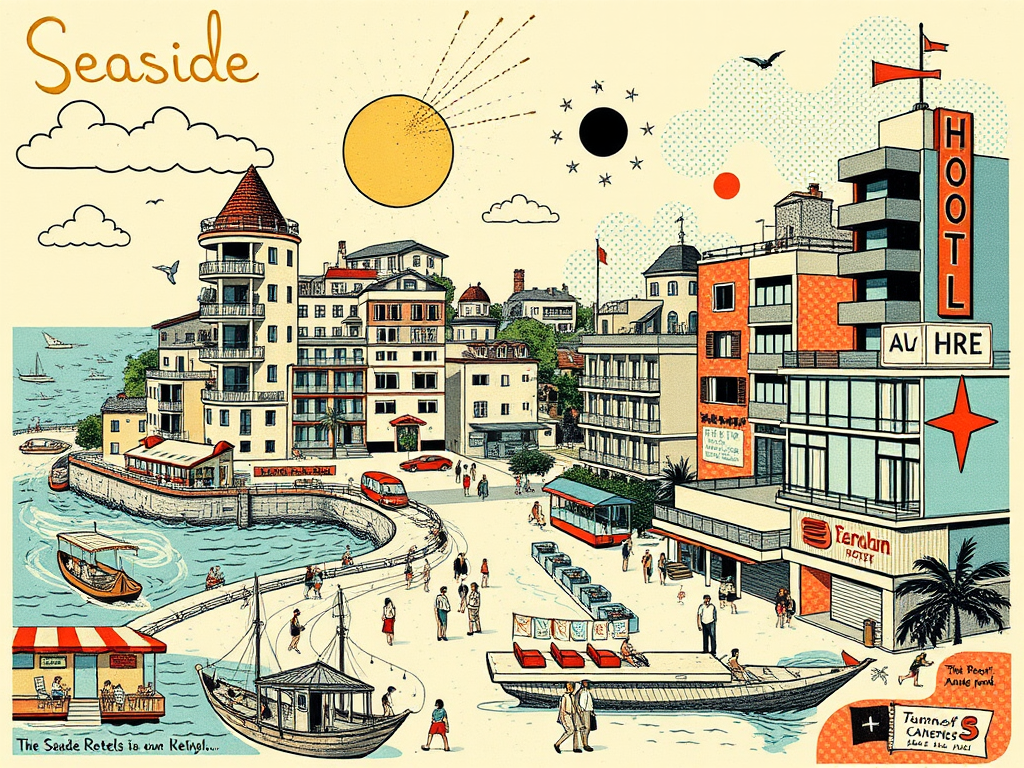
Seaside Resorts vs. City Hotels: Diversifying Hospitality Investments in Greece
Reading time: 12 minutes
Table of Contents
- Introduction
- The Greek Hospitality Market Overview
- Seaside Resorts: Capitalizing on Tourism Trends
- City Hotels: Tapping into Urban Growth
- Comparative Analysis: Seaside Resorts vs. City Hotels
- Investment Strategies and Considerations
- The Role of Government Initiatives
- Future Outlook and Market Projections
- Conclusion
- FAQs
Introduction
As we delve into the intricate landscape of hospitality investments in Greece, it’s crucial to understand the nuanced dynamics between seaside resorts and city hotels. This comprehensive analysis aims to provide investors with a data-driven perspective on diversifying their portfolios within the Greek hospitality sector. With the country’s rich cultural heritage, stunning coastlines, and vibrant urban centers, Greece offers a unique proposition for those looking to capitalize on both traditional tourism and evolving travel trends.
The Greek Hospitality Market Overview
Greece’s hospitality sector has demonstrated remarkable resilience and growth potential, even in the face of global economic uncertainties. In 2022, the country welcomed over 27 million international visitors, surpassing pre-pandemic levels and generating revenue of approximately €17.6 billion. This robust performance underscores the enduring appeal of Greece as a premier tourist destination.
Key market indicators paint a compelling picture:
- Average hotel occupancy rates reached 72% in popular destinations during peak season
- RevPAR (Revenue Per Available Room) increased by 18% year-over-year
- Direct contribution of travel and tourism to GDP stood at 20.8% in 2022
These figures not only reflect the sector’s current strength but also hint at the diverse opportunities available to investors across different hospitality segments.
Seaside Resorts: Capitalizing on Tourism Trends
Seaside resorts have long been the backbone of Greece’s tourism industry, attracting millions of visitors annually with their promise of sun, sea, and sand. The allure of Greek islands and coastal regions remains undiminished, with data showing a consistent upward trend in both visitor numbers and average spend per tourist.
Market Performance and Investment Potential
Recent data from the Greek Tourism Confederation (SETE) reveals:
- Coastal and island destinations accounted for 70% of total tourism revenue in 2022
- Average length of stay in seaside resorts was 7.2 nights, compared to 3.5 nights in urban hotels
- Luxury and upper-upscale seaside resorts saw a 25% increase in ADR (Average Daily Rate) over the past two years
These trends underscore the continued profitability and growth potential of seaside resort investments. However, it’s important to note that this segment also faces unique challenges, including seasonality and increased competition from emerging Mediterranean destinations.
City Hotels: Tapping into Urban Growth
While seaside resorts dominate the traditional tourism landscape, city hotels in Greece are emerging as compelling investment opportunities. Urban centers like Athens, Thessaloniki, and Patras are experiencing a renaissance, driven by a combination of cultural tourism, business travel, and urban regeneration projects.
Urban Hospitality Trends and Opportunities
Recent market data highlights the growing appeal of city-based hospitality investments:
- Athens saw a 32% increase in international arrivals in 2022 compared to 2019
- Business travel to Greek cities rebounded strongly, with corporate bookings up 45% year-over-year
- Boutique and lifestyle hotels in urban areas reported occupancy rates exceeding 80% during shoulder seasons
These trends reflect a shifting dynamic in Greek tourism, with cities increasingly positioning themselves as year-round destinations. This presents unique opportunities for investors to capitalize on the growing demand for urban hospitality experiences.
Comparative Analysis: Seaside Resorts vs. City Hotels
To provide a comprehensive perspective for investors, it’s essential to directly compare the performance and potential of seaside resorts and city hotels across key metrics:
Occupancy Rates and Seasonality
Seaside Resorts:
– Peak season (June-August) occupancy: 85-95%
– Off-season occupancy: 30-40%
– Operational months: Typically 6-8 months per year
City Hotels:
– Year-round average occupancy: 70-75%
– Seasonal fluctuations less pronounced
– Operational year-round with more consistent demand
Revenue Generation and Profitability
Seaside Resorts:
– Higher ADR during peak season (€150-€300 for 4-5 star properties)
– Stronger RevPAR performance in summer months
– Higher operational costs due to seasonal staffing and maintenance
City Hotels:
– More consistent ADR throughout the year (€100-€200 for 4-5 star properties)
– Steadier RevPAR with less seasonal variation
– Lower operational costs due to year-round staffing and urban infrastructure
Investment Requirements and Returns
Seaside Resorts:
– Higher initial capital investment (€15-30 million for a mid-sized resort)
– Longer ROI period (typically 8-12 years)
– Potential for higher peak season returns
City Hotels:
– Lower initial capital investment (€8-20 million for a mid-sized hotel)
– Shorter ROI period (typically 5-8 years)
– More consistent year-round returns
Investment Strategies and Considerations
When considering hospitality investments in Greece, a diversified approach that balances seaside resorts and city hotels can offer the best of both worlds. Here are some strategic considerations for investors:
Portfolio Diversification
Combining investments in both seaside resorts and city hotels can help mitigate risks associated with seasonality and market fluctuations. A balanced portfolio might include:
- 60% allocation to seaside resorts in prime locations
- 30% allocation to urban hotels in major cities
- 10% allocation to niche or emerging market segments (e.g., eco-resorts, wellness retreats)
Market Positioning and Branding
Tailoring your investment strategy to target specific market segments can enhance profitability:
- Seaside Resorts: Focus on luxury and all-inclusive offerings to capture high-value tourists
- City Hotels: Emphasize boutique and lifestyle concepts to attract both leisure and business travelers
Operational Efficiency and Technology Integration
Implementing cutting-edge technology and efficient operational practices can significantly impact profitability:
- Invest in property management systems that optimize pricing and occupancy
- Utilize AI-driven guest experience platforms to enhance personalization and loyalty
- Implement sustainable practices to reduce operational costs and appeal to eco-conscious travelers
The Role of Government Initiatives
The Greek government has implemented several initiatives to stimulate investment in the hospitality sector, which can significantly impact the attractiveness of both seaside resorts and city hotels:
Investment Incentives
- Tax breaks for large-scale tourism investments (over €20 million)
- Fast-track licensing procedures for strategic tourism projects
- Subsidies for energy efficiency upgrades and sustainable tourism initiatives
Infrastructure Development
Ongoing infrastructure projects are enhancing the appeal of various destinations:
- Expansion and modernization of regional airports to improve accessibility to island resorts
- Urban regeneration projects in Athens and Thessaloniki, boosting the attractiveness of city hotels
Additionally, the greece investor visa program offers an attractive pathway for non-EU investors to gain residency through real estate investments, including hospitality properties.
Future Outlook and Market Projections
As we look towards the future of Greece’s hospitality sector, several key trends and projections emerge:
Seaside Resorts
- Continued strong demand, with projected annual growth of 5-7% in visitor numbers
- Increasing focus on sustainable and eco-friendly resort concepts
- Growing interest in experiential and cultural offerings to complement traditional beach holidays
City Hotels
- Accelerating growth in urban tourism, with projected annual increases of 8-10% in overnight stays
- Rising demand for mixed-use developments combining hotels with retail and office spaces
- Emergence of “bleisure” travel trends, blending business and leisure stays in city centers
Overall, the Greek hospitality market is poised for continued growth, with projections suggesting a 25% increase in total tourism revenue by 2028. This growth is expected to be distributed across both seaside resorts and city hotels, albeit with varying dynamics and opportunities in each segment.
Conclusion
The Greek hospitality sector offers a compelling landscape for investors, with both seaside resorts and city hotels presenting unique opportunities and challenges. While seaside resorts continue to capitalize on Greece’s enduring appeal as a sun-and-sea destination, city hotels are emerging as dynamic investment prospects, tapping into evolving travel trends and urban regeneration.
A diversified investment strategy that balances these two segments can provide a robust foundation for long-term growth and profitability. By leveraging government incentives, embracing technological innovations, and aligning with sustainability trends, investors can position themselves to capitalize on the continued expansion of Greece’s tourism industry.
As the market evolves, staying attuned to shifting consumer preferences, economic indicators, and global travel trends will be crucial for making informed investment decisions. Whether opting for the seasonal allure of coastal resorts or the year-round potential of urban hotels, the Greek hospitality sector remains a vibrant and promising arena for astute investors.
FAQs
1. What are the main differences in investment potential between seaside resorts and city hotels in Greece?
Seaside resorts typically offer higher peak-season returns but face more pronounced seasonality, while city hotels provide more consistent year-round revenue with lower seasonal fluctuations. Seaside resorts often require higher initial investments but can yield substantial returns during peak tourist seasons. City hotels generally have lower entry costs and offer more stable occupancy rates throughout the year.
2. How does the Greece investor visa program impact hospitality investments?
The Greece investor visa program allows non-EU investors to obtain residency permits through real estate investments, including hospitality properties. This can make investing in Greek hotels and resorts more attractive to international investors, potentially increasing demand and values in the sector.
3. What are the key trends shaping the future of Greek hospitality investments?
Key trends include a growing focus on sustainability and eco-friendly practices, increasing demand for experiential and cultural tourism offerings, the rise of “bleisure” travel in urban centers, and the integration of advanced technologies to enhance guest experiences and operational efficiencies.
4. How can investors mitigate the risks associated with seasonality in Greek tourism?
Investors can mitigate seasonality risks by diversifying their portfolios to include both seaside resorts and city hotels, investing in properties that offer year-round attractions or amenities, implementing dynamic pricing strategies, and focusing on marketing to attract off-season visitors through targeted promotions and events.
5. What government incentives are available for hospitality investments in Greece?
The Greek government offers various incentives for hospitality investments, including tax breaks for large-scale tourism projects, fast-track licensing procedures, subsidies for sustainable tourism initiatives, and infrastructure development support. Additionally, the Greece investor visa program provides residency opportunities for non-EU investors making significant real estate investments.

Article reviewed by Enzo Almeida, Business Scaling Expert | Growth Strategist | Driving Expansion in Emerging Markets, on March 14, 2025
